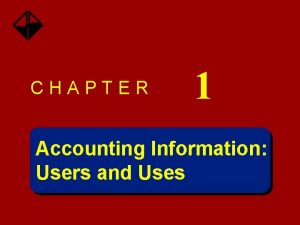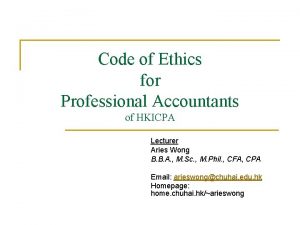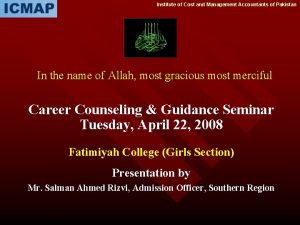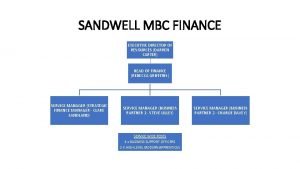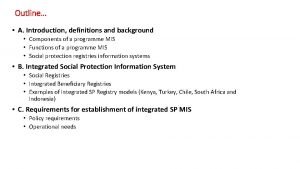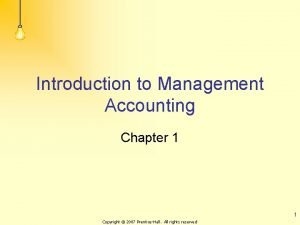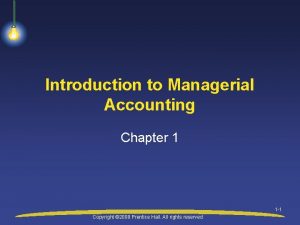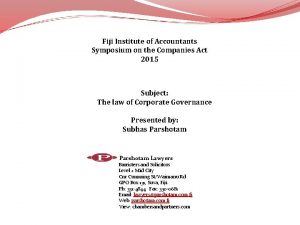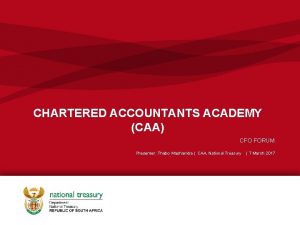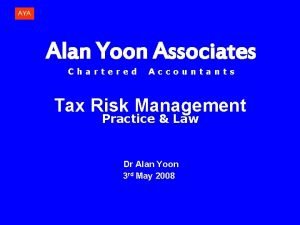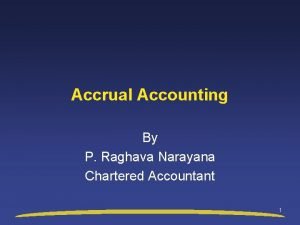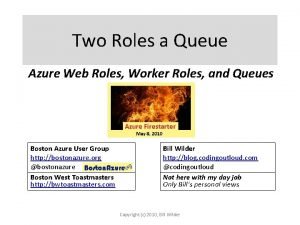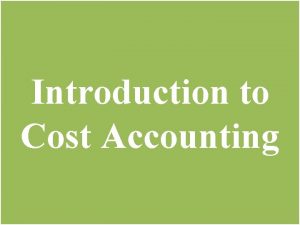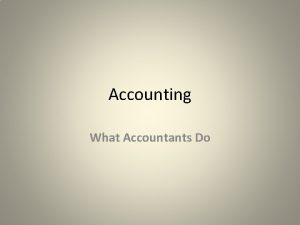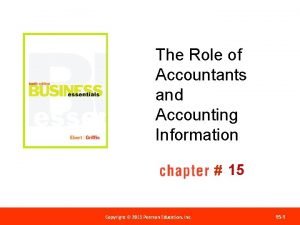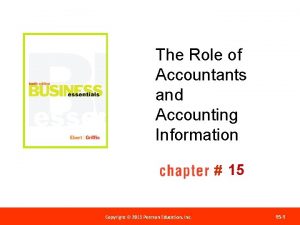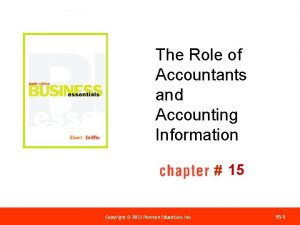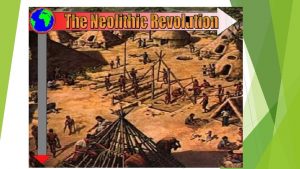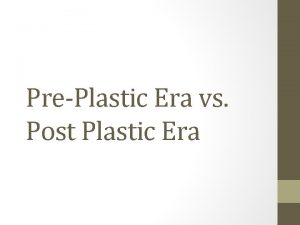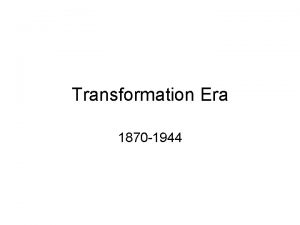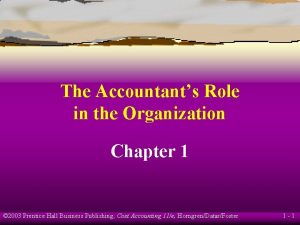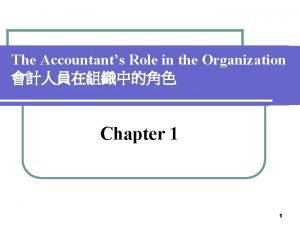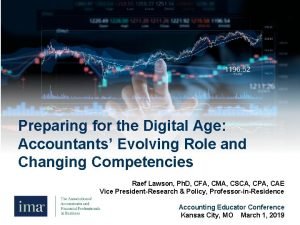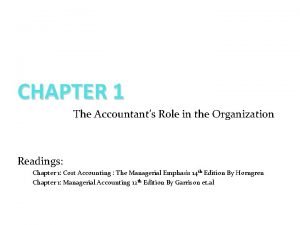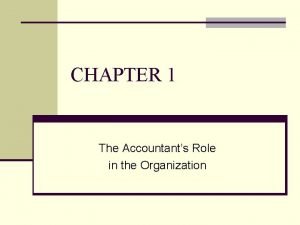REVISITING ACCOUNTANTS ROLE IN THE ERA OF INFORMATION
























- Slides: 24

REVISITING ACCOUNTANTS’ ROLE IN THE ERA OF INFORMATION TECHNOLOGY ADVANCEMENT Nafsiah Mohamed International Conference on Accounting and Finance ( 4 th ICAF UMY 2018) 25 th APRIL 2018 Universitas Muhammadiyah, Yogyakarta


■ New technologies like artificial intelligence, 3 D printing, and robotics are emerging with the potential for having a transformative impact on industry, the economy and society as a whole. ■ The speed and scope of this technological transformation is exponential with the potential for unlimited possibilities and endless opportunities.

§ What are the implications for the universities, educators and students? § How do we redefine career readiness and better prepare students for an uncertain future?

What is accounting? ■ Drury (2009) states that Accounting is the process of identifying, measuring, and communicating economic information to permit informed judgements and decisions by users of information. ■ An accountant is regarded as a practitioner of accounting. ■ So, Accountants have the responsibility in the organization for managing, correcting, and reporting the organization’s account.

Who is an accountant? ■ An accountant is a person who performs financial functions related to the collections, accuracy, recording, analysis, and presentation of a business, organization or company’s financial operations. ■ The accountant usually has a variety of administrative roles within a company operations. ■ In a smaller business, an accountant’s role may consists of financial data collection, entry and report generation. ■ Middle to larger size companies, an accountant act as advisor and financial interpreter, who may present the company’s financial data to people within and outside of the business. ■ The accountant can also deal with third parties such as vendors, customers and financial institution.

■ As technology becomes increasingly sophisticated and present in all aspects of businesses, accountants can expect a shift towards more strategic and analytical roles. ■ The accounting profession will face significant changes, and professional organizations should respond to these changes. ■ Today, we are on the verge of a fourth industrial revolutions, dubbed Industry 4. 0. ■ How accountants can survive Industry 4. 0?


■ Industrial revolution started as early as 1800 s. On 1700 s, it was started by the commercial steam engine and mechanical eras. It known as Industry 1. 0. ■ It was followed by the result of electricity and mass production that sparked in the early 20 th century. It was introduced into assembly lines. Industry 2. 0 started on 1900 s. ■ Then, it continued to evolve as the result of the computer set in 1970 s known as Industry 3. 0. At this point, everything started to become digital and elements of manufacturing shifted into automation and robotic. Electronics and IT (ex: computers) and internet constitute the beginning of the information age. ■ Up till 2015, only then, Industry 4. 0 was introduced. It were the started of digital supply chain, digital products and services, and business models. Data analytics and action begin as a core competency.

What is Industry 4. 0 ? The Fourth Industrial revolution in manufacturing and industry The current industrial transformation with data exchanges, cloud, cyber -physical system, big data, artificial intelligence (AI), Internet of Things (IOT) and more Industries are demand to adapt and agile in : * Intelligent and self-learning software robots * Required multi-skilled, multi-disciplined and multijobs *ceasing of present with unknown future job

Other Definitions Davies, 2015 KPMG's, 2016 • The comprehensive transformation of the entire industrial production through the merging of Internet and information & communication technologies (ICT) with traditional manufacturing processes • The full integration of information and communication technology and automation technology in the "factory of the future. " SME Corp Malaysia, 2017 • About companies orienting themselves to the customers through e-Commerce, digital marketing, social media and the customer experience.

The complexity of Industry 1. 0 to 4. 0


Impact on Higher Education How will the lecturers teach? (Method) What are the roles of the lecturers? How will the students learn? What will the lecturers teach? (Content) What are the roles of students? What are the attributes of the students/lecturer s? How will the learning space look like?

The University of The Future Change Of Organizational Structures • Change of business model • Cooperative structures enhancing interdisciplinary • New concept for faculties or departments Change Of Accreditation Procedures • New role of examination offices • No fixed degree programs • Acceleration in education according to fast innovation cycles Change Of Teaching Methods Change Of Learning • New teaching concepts (e. g. , flipped classroom) • New teaching infrastructures (e. g. , equipment for virtual worlds) • Digital rights management • Massive vs personalized learning • New learning infrastructure e. g. , increased computing capacities • Shift from presence learning to distance learning

Education 4. 0 ■ Responds to the need of Industry 4. 0, where man and machine align to enables new possibilities. ■ Harnesses the potential of digital technologies, personalized data, open sourced content, and the new humanity of this globallyconnected, technology-fueled world ■ Establishes a blueprint for the future of learning-lifelong learningfrom childhood schooling, to continuous learning in the workplace, to learning to play a better role in society.


Implication to Accounting Cloud computing and big data ■ Future accountants will need education in digital technologies such as Evolving regulations (tax regulation, new forms of corporate reporting, integrated reporting regulations Globalization (outsourcing accounting services)

q Industry 4. 0 can be expected to influence accounting practice in the following ways. It will: v enable accountants to obtain previously unobtainable data in real time – through embedded sensors v facilitate data extraction from large common pools – for all types of decisions, all types of managers, all types of gatekeepers and all kinds of stakeholders v raise the quality of data – through greater timeliness and higher accuracy and detail to improve efficiency, data assurance and other decision-making purposes v improve transfer of data for management planning and control – eg, in supply and value chains and between countries v increase the credibility and relevance of reporting – through self-controlling, self-auditing systems and demand pull custom accounting for individuals.

q Thus, in an Industry 4. 0 world, accountants in business would have the opportunity to be less involved with automated operations and focus more on big-picture strategies such as resource efficiency.

■ The accountant’s role has evolved with time. They are no longer just number crunches. ■ Businesses rely on their finance team to provide strategic advice on top of compliance and cost saving guidance. This interpersonal capability is where the technology will fall short. ■ What accountants will need to do is keep abreast of technology to maintain a competitive age in the market, and develop their digital skills which employers will increasingly be in search of.

■ To remain relevant, accountants should enhance their knowledge on value-added services which include advising clients and providing strategic insight on critical financial transactions. ■ People are irreplaceable, especially at higher levels. ■ Adaptation to business expectation is the key.


Daun selasih Daun mengkudu Terima kasih Thank You.
 Primary users of accounting information are accountants
Primary users of accounting information are accountants Baroque music quiz
Baroque music quiz Elizabethan or victorian
Elizabethan or victorian Creí que era una aventura y en realidad era la vida
Creí que era una aventura y en realidad era la vida Era uma estrela tão alta era uma estrela tão fria
Era uma estrela tão alta era uma estrela tão fria Code of ethics for professional accountants
Code of ethics for professional accountants Institute of cost and management accountants of pakistan
Institute of cost and management accountants of pakistan Pers aswani
Pers aswani Accountants professional indemnity insurance
Accountants professional indemnity insurance Strategic accountant
Strategic accountant Mdd forensic accountants
Mdd forensic accountants جامعه حسابداران رسمی
جامعه حسابداران رسمی Institute of certified public accountants in israel
Institute of certified public accountants in israel New jersey association of public accountants
New jersey association of public accountants The institute of management accountants adopted the ______.
The institute of management accountants adopted the ______. Michigan association of certified public accountants
Michigan association of certified public accountants δwc
δwc Dfg legal costs accountants
Dfg legal costs accountants Chapter 1 managerial accounting
Chapter 1 managerial accounting Fiji institute of accountants
Fiji institute of accountants Egaming accountants
Egaming accountants Chartered accountants academy
Chartered accountants academy Alan yoon associates
Alan yoon associates Accrue chartered accountants
Accrue chartered accountants Azure worker role
Azure worker role
